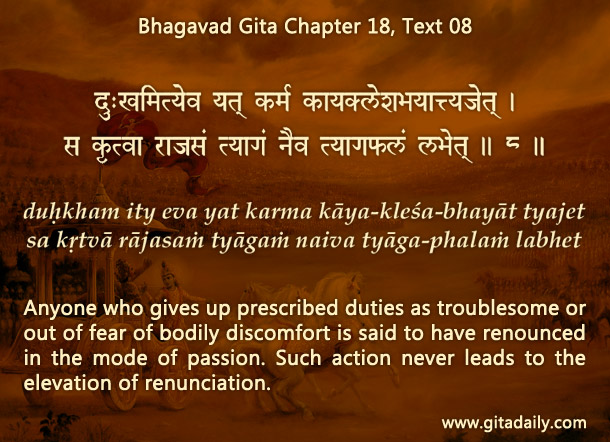We live in a culture of aversion to commitment. People want to dabble in things, especially relationships, without committing. Such unwillingness to commit is a primary cause of the widespread breakdown of marriages in contemporary society.
Unfortunately, our aversion to commitment may get aggravated on the spiritual path if we conflate it with detachment. Detachment means becoming indifferent to the mind’s schemes for material indulgence. Such indifference comes from realizing that worldly things never live up to their promise of pleasure.
In contrast, aversion to commitment comes from our desire to stay open to the mind’s many schemes. We still believe that material things will provide pleasure – we are just unsure which of the mind’s schemes will provide the most pleasure. As sticking to one option often implies losing the other options, we refuse to commit to anything.
Pertinently, the Bhagavad-gita (18.08) cautions that renunciation adopted because of the fear of discomfort is renunciation in the mode of passion. In our context, the discomfort is the price of committing to any one option. The same Gita verse cautions that such renunciation doesn’t bear fruit – it doesn’t lead to purification or liberation, the purposes of spiritual growth.
To help us purify the mind, the Gita recommends bhakti-yoga. This yoga of love requires commitment – commitment to the devotional practices that bring us closer to all-pure Krishna. This proximity calms and clears the mind, thereby enabling us to develop detachment. Therein, we give up the attachments that hold us back and take up the commitments that bring out our best.
To summarize, detachment means closing the door to the mind’s proposals, whereas aversion to commitment means keeping all the doors open. Detachment is a virtue that helps us turn away from matter towards spirit, whereas aversion to commitment is a weakness that keeps us locked in matter.
To know more about this verse, please click on the image
Explanation of article:

Podcast:
Download by “right-click and save”


Beautifully explained this so subtle and very relevant topic for the modern society. Understanding this fine difference is so important especially when technological pursuits today encourages and demands to be in a constant restless state of mind and being not committed to one path. Thanks you very much prabhuji for above explanation.
Thanks, Amol P, for the comment that shares another important contemporary application of this Gita message.
ys
ccdas
aversion is temporary,while detachment is permanant
Yes, Father. Thanks for sharing this pertinent and concise insight.
ys
ccdas
Hare Krishna Prabhuji. thanks
Bhakthi yoga helps for perfect detachment.
Is prescribed duty and Bhakthi yoga can be aligned? Most of the times, one has to give up
what he assumes to be a duty. How to know whether that ” giving up” is commitment towards higher purpose or aversion . how to deal with those challenges.
Answered here: https://www.thespiritualscientist.com/2019/02/how-can-we-know-when-we-are-renouncing-because-of-spiritual-attraction-and-when-because-of-material-aversion/